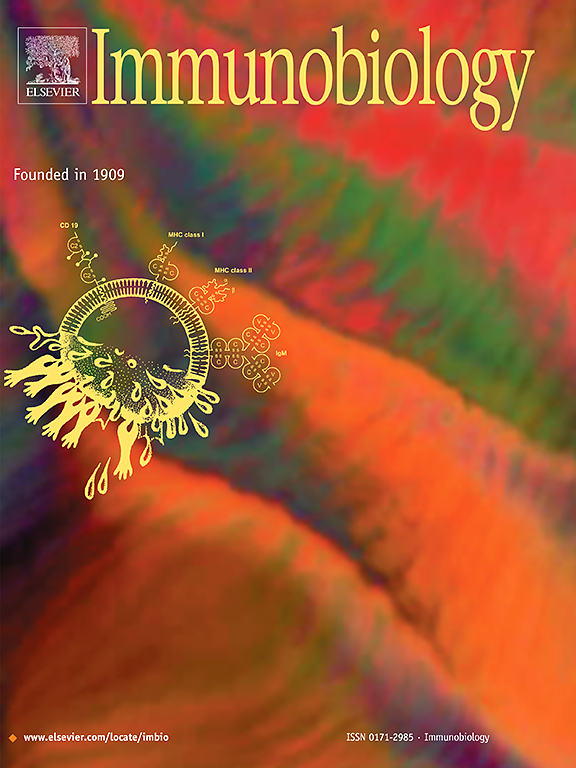Genetic variants in complement-related genes: potential implications for cancer risk and progression
IF 2.3
4区 医学
Q3 IMMUNOLOGY
引用次数: 0
Abstract
The complement system is a critical component of the immune system, playing a significant role in pathogen defense and immune regulation. In cancer, it has a complex and dual role, either aiding in immune surveillance or contributing to tumor progression and immune evasion, depending on the specific context. While genetic and epigenetic regulation of complement-related genes has been studied in various diseases, its influence on cancer remains underexplored. This review focuses on how genetic variants in complement pathway genes may modulate cancer susceptibility, progression, and treatment outcomes. Genome-wide association studies (GWAS) have identified several key single nucleotide polymorphisms (SNPs) linked to complement genes, such as C3, C7, CFHR4 and ITGB2, which could influence immune responses and cancer development. Additionally, epigenetic modifications, such as DNA methylation, have been shown to regulate the expression of complement genes in cancer, adding further complexity to our understanding of their role in tumor immunity. Challenges remain in translating genetic and epigenetic insights into therapeutic strategies. The complex nature of cancer, tissue-specific complement regulation, and the difficulty in identifying reliable biomarkers complicate the development of targeted complement-based therapies for precision medicine. Therefore, future research combining genetic, genomic, and epigenomic data, along with functional genomics and proteomics, is needed to elucidate the potential roles of regulatory variants of complement genes in cancer. In addition to mechanistic studies, this information can be used to guide personalized treatment strategies for cancer patients.
补体相关基因的遗传变异:对癌症风险和进展的潜在影响
补体系统是免疫系统的重要组成部分,在病原体防御和免疫调节中起着重要作用。在癌症中,它具有复杂的双重作用,根据具体情况,要么帮助免疫监视,要么促进肿瘤进展和免疫逃避。虽然补体相关基因的遗传和表观遗传调控已在各种疾病中得到研究,但其对癌症的影响仍未得到充分探讨。这篇综述的重点是补体途径基因的遗传变异如何调节癌症的易感性、进展和治疗结果。全基因组关联研究(GWAS)已经确定了与补体基因(如C3、C7、CFHR4和ITGB2)相关的几个关键单核苷酸多态性(snp),它们可能影响免疫反应和癌症发展。此外,表观遗传修饰,如DNA甲基化,已被证明可以调节补体基因在癌症中的表达,这进一步增加了我们对补体基因在肿瘤免疫中的作用的理解的复杂性。在将遗传学和表观遗传学的见解转化为治疗策略方面仍然存在挑战。癌症的复杂性、组织特异性补体调节以及确定可靠生物标志物的困难使精准医学靶向补体治疗的发展复杂化。因此,未来的研究需要结合遗传学、基因组学和表观基因组学数据,以及功能基因组学和蛋白质组学,来阐明补体基因调控变异体在癌症中的潜在作用。除了机理研究外,这些信息还可用于指导癌症患者的个性化治疗策略。
本文章由计算机程序翻译,如有差异,请以英文原文为准。
求助全文
约1分钟内获得全文
求助全文
来源期刊

Immunobiology
医学-免疫学
CiteScore
5.00
自引率
3.60%
发文量
108
审稿时长
55 days
期刊介绍:
Immunobiology is a peer-reviewed journal that publishes highly innovative research approaches for a wide range of immunological subjects, including
• Innate Immunity,
• Adaptive Immunity,
• Complement Biology,
• Macrophage and Dendritic Cell Biology,
• Parasite Immunology,
• Tumour Immunology,
• Clinical Immunology,
• Immunogenetics,
• Immunotherapy and
• Immunopathology of infectious, allergic and autoimmune disease.
 求助内容:
求助内容: 应助结果提醒方式:
应助结果提醒方式:


